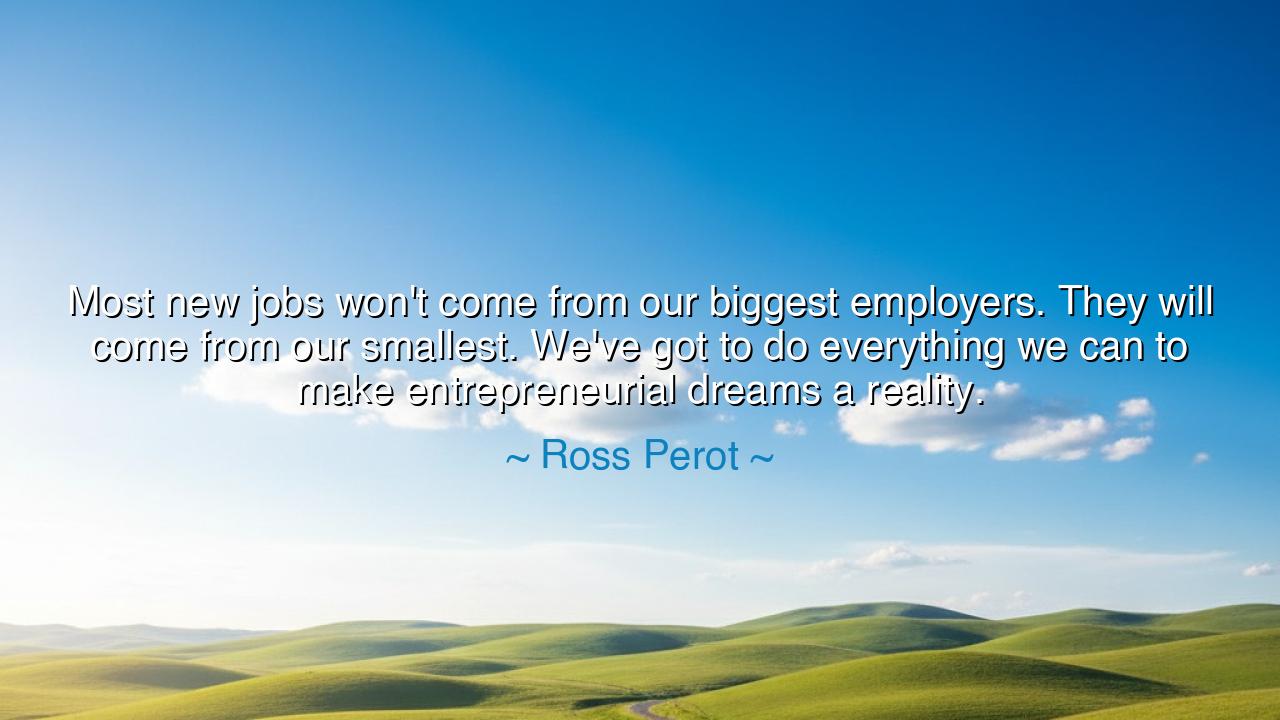
Most new jobs won't come from our biggest employers. They will
Most new jobs won't come from our biggest employers. They will come from our smallest. We've got to do everything we can to make entrepreneurial dreams a reality.






In the words of Ross Perot, "Most new jobs won't come from our biggest employers. They will come from our smallest. We've got to do everything we can to make entrepreneurial dreams a reality," we hear a powerful call to reimagine how economic growth is fostered and where opportunity truly lies. Perot’s statement is a reflection on the growing importance of the small business and the entrepreneurial spirit as the engines of innovation and job creation in a rapidly changing world. As societies evolve, the vastness and power of the largest corporations might appear overwhelming, but it is the smallest ventures, driven by individual dreams, that hold the key to future prosperity. The entrepreneurial dream is not just a vision of success; it is a vital necessity for economic renewal and social progress.
This sentiment resonates deeply with the ancient ideals of self-reliance and innovation. In ancient Greece, the city-states were often built upon the efforts of individuals and small guilds of craftsmen and traders. Athens, in particular, thrived not solely due to its powerful political structures but because of the spirit of the artisan, the merchant, and the philosopher—those who dared to dream and create outside the bounds of established systems. The ancients valued the idea of the individual contributing to the collective prosperity, and the role of entrepreneurship in society was seen as central to the cultural and economic flourishing of the time. Perot’s words echo this ancient truth: it is the smallest efforts, driven by innovation and courage, that often have the power to transform societies in the long run.
Consider the story of Leonardo da Vinci, who, though known for his masterpieces in painting and sculpture, was also an inventor and entrepreneur in his own right. Da Vinci’s creativity extended beyond the realm of the arts; he imagined and designed machines, water systems, and weapons that were well ahead of his time. Though he never saw many of his ideas realized in his lifetime, his entrepreneurial dreams of innovation sparked a future that would come to fruition through generations of inventors and creators. Much like Perot’s vision of entrepreneurship, Da Vinci’s life shows that even in the smallest ideas, the seeds of revolutionary change can take root and grow.
In the modern world, we can observe this entrepreneurial spirit in the story of Steve Jobs, the co-founder of Apple Inc. Jobs began not in a grand corporation but in the modest environment of his garage—a small, humble space where his ideas would eventually revolutionize the technology industry. His entrepreneurial dream was not just about building products but about creating a culture of innovation, risk-taking, and creativity. Apple, though now one of the largest companies in the world, began with an individual vision. Jobs exemplified the power of small ventures and their ability to spark large-scale change in the world, proving Perot’s point that the most significant job growth and innovation often come from the smallest of beginnings.
The lesson in Perot’s words is clear: we must shift our focus toward nurturing the dreams and visions of the entrepreneur. While large corporations may dominate the headlines, the true lifeblood of economic innovation and job creation lies in the hands of those who dare to imagine something new, to take risks, and to build something from nothing. The entrepreneurial spirit, fueled by creativity and determination, has always been the driving force behind economic renewal, social change, and technological progress. Just as the ancients honored the contributions of individual craftsmen, we must recognize the value of small ventures and support them in every way possible.
To take practical action in our own lives, we must first embrace the spirit of entrepreneurship. Whether we are launching a business, creating art, or simply pursuing a vision, we must adopt the mindset of an entrepreneur—driven by passion, but grounded in discipline and dedication. We must also support and nurture the efforts of others who seek to dream, innovate, and create. By providing mentorship, resources, and opportunities for small businesses, we ensure that the next generation of entrepreneurs has the tools they need to thrive. Like Perot said, the future of job creation and economic vitality lies not in the giants but in the bold ideas and small efforts that, when nurtured, can lead to profound and lasting impact.
As we move forward, let us embrace the entrepreneurial dreams of those around us, recognizing that these small sparks of creativity can light the way to a brighter, more prosperous future for all. Whether in our own endeavors or in the support of others, let us cultivate the tools needed to turn dreams into reality, for it is through entrepreneurship that we build the foundation for a society that thrives on innovation, opportunity, and shared success. Just as the ancients honored the dreamers and builders of their time, so must we honor and nurture the entrepreneurs of our age.






AAdministratorAdministrator
Welcome, honored guests. Please leave a comment, we will respond soon